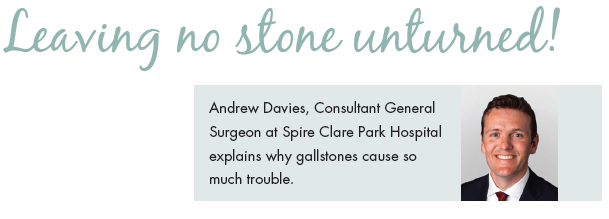
Andrew Davies, a Consultant General Surgeon at Spire Clare Park, Farnham and Guy’s & St Thomas’ NHS Foundation Trust, explains why gallstones cause so much trouble.
Unless you’ve had gallstones (or alternatively kidney stones or been through labour) it is almost impossible to appreciate just how painful this common condition can be. About 15% of the population have gallstones and removal of the gallbladder remains one of the most common surgeries performed today. They occur when chemical imbalances occur in bile, leading to the formation of crystals (stones) but in truth the exact balance between nature (genetics) and nurture (lifestyle risk factors) is poorly understood. Bile is produced by your liver to help digest food and some of this is stored in the gallbladder which acts as a bile reservoir. When you eat, the gallbladder contracts and pushes bile into the intestine to aid digestion. This explains why gallstones patients often experience pain during or shortly after meals. The pain may be felt in the upper abdomen, often on the right hand side and sometimes in the back or right shoulder. This corresponds to the anatomical location of the gallbladder, sitting below the liver underneath the right rib cage. Occasionally nausea or indigestion symptoms are the principle complaint.
Gallstones are often made up of cholesterol but this does not necessarily mean a given patients’ blood cholesterol levels are high. The presence of stones may be picked up incidentally, often by an abdominal ultrasound scan being performed for investigation of other conditions. Truly asymptomatic gallstones may be managed non-operatively although patients often appreciate a consultation to discuss the rationale for this decision and the possible long-term complications of having gallstones.
Patients with symptomatic gallstones generally elect for surgery because of the severity of the pain and the fact that symptoms rarely resolve spontaneously once they have begun. In addition there are the risks of inflammation in the gall bladder (cholecystitis) or stones dropping out of the gallbladder and causing problems in adjacent organs (such as inflammation of the pancreas gland -pancreatitis). In this respect small stones can ironically be more troublesome than large ones. Although relatively rare, this can potentially be a very serious condition. Once a patient has had a confirmed episode of gallstone pancreatitis, surgery to remove the gallbladder is generally mandated to prevent further attacks.
Fortunately, gallbladder surgery performed by specialists is very safe and well tolerated. Most patients are suitable for keyhole surgery and can leave hospital on the same day as their procedure. Recovery is generally only 1-2 weeks and driving can often be resumed within 1 week. Patients are instantly cured of their gallbladder symptoms and once recovered, there are no long term restrictions on activity or diet. In some ways the surgery may be liberating, as some patients who have avoided certain types of foods (e.g fatty / fried) for a long time suddenly find they can eat whatever they wish without consequence. As with any surgery there are some small risks, such as conversion to open (non-keyhole) surgery in 1% of cases and damage to adjacent anatomical structures (1 in 500 case), but your surgeon should be prepared to go through these with you on an individual basis. Despite various targets, NHS waiting lists can still be long, which in a group of very symptomatic, often young patients with children and work commitments can represent a significant challenge. To meet this growing demand, Clare Park offers additional private and self-pay options with surgery being available in a matter of weeks.
More information on gallstones can be obtained at www.londonsurgicalgroup.co.uk. Mr. Davies is a specialist laparoscopic and upper gastro-intestinal surgeon and sees both private and choose & book patients at Clare Park. Appointments can be made by contacting the practice secretary (02037635933) or Clare Park hospital directly (01252 895490)




